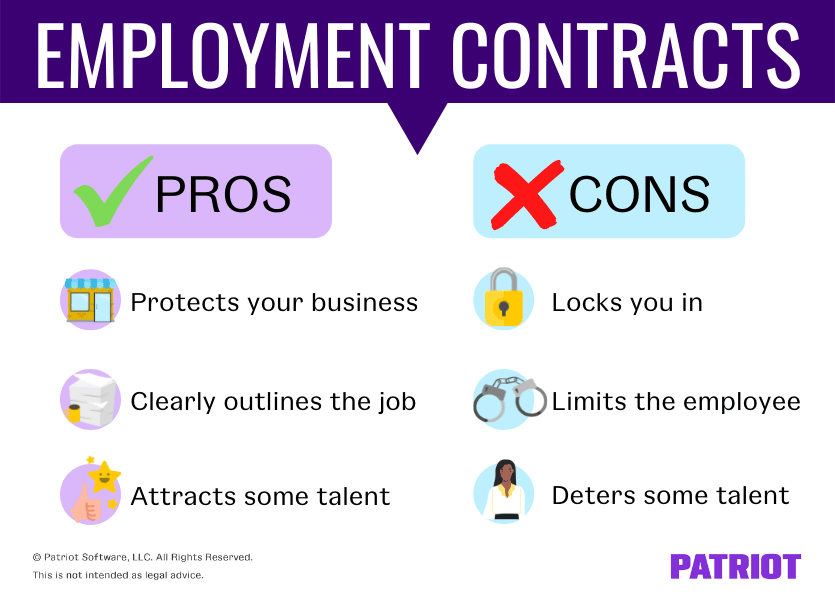All states except Montana are at-will employment states, meaning employers and employees can end their relationship whenever they want. Employees can leave at any time, and employers can terminate an employee for any legal reason. However, the rules change if there’s an employment contract in play.
For some businesses, using an employment contract makes sense. But does it make sense for yours? To find out, learn what is a contract of employment and the pros and cons of a job contract. And, read about other types of contracts you might consider.
What is an employment contract?
An employment contract is generally a written, legal document between an employer and employee that outlines relationship terms and conditions. Employment contracts are also called job contracts, contracts of employment, or employment agreements. A contract is only a binding legal document if the employee signs it.
In some cases, you might write up a fixed-term contract. Under a fixed-term contract, the employee’s job isn’t ongoing. Instead, there is a set end date for employment.
So, what kind of information goes into a standard employment contract? A contract between employer and employee might contain:
- Employment contract title
- Names of the parties (i.e., “the Employer” and “the Employee”)
- Effective date of contract
- Employment type (e.g., full-time vs. part-time)
- Job duration (e.g., two years)
- Job description
- Employee schedule
- Employee responsibilities
- Compensation
- Employee benefits
- Waiting periods (e.g., health insurance)
- Termination information
You might consider using a basic employment contract template as well as an employment contract lawyer to get started.
If you have an employment contract with an employee, you must follow the guidelines to a T. Likewise, you can expect the employee to follow the guidelines.
Written vs. implied employment contracts
Although businesses generally put employment contracts in writing, there is also an implied employment contract. Like a written contract, an implied contract might be binding.
An implied contract is not an explicit contract. Instead, it’s an employment agreement based on spoken or written communication such as:
- Interview or promotion comments
- Employee handbook rules
- Emails between employer and employee
If you have an implied employment contract and terminate an employee, the employee might use the “contract” to fight your decision. However, not all states let employees use implied contracts to fight wrongful termination claims. And unlike written employment contracts, implied contracts are difficult to prove.
Contracts vs. at-will employment
Again, 49 states (+ D.C.) are at-will employment states. This rule applies to both employees and employers and lets either party terminate the relationship without notice.
At-will employment rules extend beyond termination flexibility. Employers can alter wages, terminate benefits, or reduce paid time off—as long as changes don’t violate state laws.
If you opt for at-will employment, you might still prepare an at-will employment agreement and ask the employee to sign it. This agreement outlines the fact that they can leave (or be terminated) at any time.
Employees with individual employment contracts are not subject to at-will employment rules. That means you cannot terminate your relationship unless the employee violates their contract. Likewise, employees cannot leave your business penalty-free unless you violate the contract.
Basically, you and the employee must follow the terms and conditions that the legal contract outlines.
Pros and cons of a job contract
According to David Aylor, Founder & CEO of David Aylor Law Offices, job contracts can be beneficial to both employees and employers in the following ways:
As an employee, employment contracts can offer better short-term job opportunities, some of which lead to longer-term and permanent employment at a company. The employment contract can be enough to get your foot in the door. On the business’s side, you’re able to hire temporary employees through short-term employment contracts and then transition the candidates that succeed without dealing with the hiring and firing of those that don’t.”
But, a work contract isn’t for everyone. Consider some other advantages, as well as the disadvantages—for both employees and employers—before using one in your business.
Pros:
- Protects your business: A contract could protect your business from quick turnover by locking in the employee for a certain period of time. It can also help mitigate lawsuits.
- Clearly outlines the job: With an employment contract, both you and the employee know what is expected of them.
- Attracts some talent: Some job seekers may prefer the job security that comes with a contract.
Cons:
- Locks you in: If your business changes and requires something different from the employee (or you realize you don’t need them at all), you are locked in. You would need to renegotiate the entire contract to change things up.
- Limits the employee: The employee may not be able to grow (e.g., new roles) if they must adhere to the terms of the contract, which could limit them and your business.
- Deters some talent: Not all job seekers want a position with a contract. You could miss out on hiring talent by requiring contracts.

Other types of agreements you might consider
An employment contract isn’t the only type of agreement you might make with your employees. You can either include clauses for other types of employment contracts or require employees to sign standalone agreements such as:
- Noncompete agreements
- Nonsolicitation agreements
- Confidentiality agreements
Like an employment contract, these types of agreements expire. Set a designated period (e.g., two years) that the agreement is binding.
Noncompete agreement
A noncompete agreement is a type of agreement that prevents employees from becoming future competitors.
Employees who sign a noncompete clause cannot work for your competitors or start a competing business. Generally, these terms apply to a certain geographic area.
Nonsolicitation agreement
A nonsolicitation agreement prevents employees from soliciting a business’s customers or employees after leaving.
So, employees who sign nonsolicitation agreements can’t poach anyone for their own business or another business when they leave (think: The Michael Scott Paper Company on The Office).
Confidentiality agreement
A confidentiality agreement, or non-disclosure agreement (NDA), requires employees to keep certain information private.
This type of contract prevents employees from revealing specific information outlined in the agreement (e.g., Recipe ABC).
This is not intended as legal advice; for more information, please click here.
